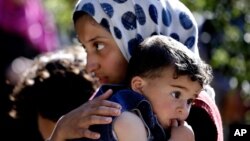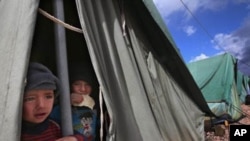AINJAR, BEKAA VALLEY, LEBANON —
Syrian refugees camped out in Lebanon's Bekaa Valley are expressing mixed reactions to Washington’s decision to send weapons to the rebels trying to oust President Bashar al-Assad. Some say the U.S. help is welcome, while others say it's too little and too late.
Many refugees remain angry with Washington and its European allies for not supplying weapons earlier during the 27 months the rebels have been battling to oust President Assad.
Lebanon: 545,795
Jordan: 478,007
Turkey: 386,927
Iraq: 158,663
Egypt: 81,487
Source: UNHCR
Some refugees and rebels have even developed complicated conspiracy theories to explain why the West has held back in Syria, contrasting that stance to NATO'S relatively early military support for the rebellion in Libya that toppled Col. Moammar Gaddafi.
The notion that the Libyan rebels established a coherent leadership early on in their struggle while the Syrians have not is dismissed as a reason for the West’s reluctance to intervene. Others say the delay in assistance guaranteed the rise of jihadists to a central role in the rebellion.
“They ignored us because of Israel – America and Israel want Syria weak,” said Hussein, a storeowner from Homs. “This is why they have allowed the war to go on for so long. The West betrayed us. Before we wanted the West to help but now they should just leave us alone.”
“Too little, too late”
Hany Almoleia, a 19-year-old opposition activists from Homs who staying in a refugee camp with 70 Syrian families near the town of Ainjar, says the U.S. policy change announced Friday is “too little, too late.”
“I am not sure I will believe it until it happens,” Almoleia said. “For now it is a promise, we take it as a promise, let’s see what happens. I am proud of our rebellion and proud we fought alone so far.”
But Mahmoud, a refugee from Damascus, says Washington’s new stance could signal a shift in the prospects for the rebel cause.
“I think it is good,” he said. “Maybe this is the beginning of the end. Anyway it is a start.”
There is, though, much debate about whether the rebels will get the U.S. and European weapons in time to counter an expected government offensive against rebel-held districts in the northern city of Aleppo.
There has been a sharp increase in the pace of fighting around Aleppo in recent days. Over the weekend, a British-based group, the Syrian Observatory for Human Rights, said government forces had been attacking Aleppo’s northern suburbs of Achrafiyeh and Bani Zeid using tanks and heavy mortars.
Anti-aircraft and anti-tank weapons wanted
For Syrians in Bekaa Valley, there are also questions about whether U.S.-supplied arms will include the more sophisticated weaponry rebels have been demanding for months – shoulder-launched missiles capable of downing Syrian Air Force planes or rockets that can take out Army tanks.
“Light weapons and ammunition will help us, but we need much heavier arms to win this war,” said Mahmoud. “I hope this isn’t just a lifeline that allows the rebellion to survive, but doesn’t give us enough to win.”
But Mazen, a 25-year-old father of one from the war-battered Damascus suburb of Jobar, had a very different response to the U.S. change of course.
Before the war, Mazen was convinced that the Assad regime had to go. Now he wasn’t so sure. He had heard on the news about U.S. Secretary of State John Kerry’s comment that supplying the rebels with weapons might help get talks started in Geneva to work out a negotiated settlement to the Syria war.
“I want a settlement,” Mazen said. “I look at Iraq and Libya and see all the trouble they had after. If one side or another wins this war, the winning side will reap revenge; there will be a lot more killing.”
Mazen said he was also worried that the secular rule under the Assad regime might be replaced by a hardline Islamist government if the al-Qaida linked opposition rebel group al-Nusra has its way.
“I don’t want Nusra,” Mazen said. “If these weapons help to secure a deal, I will be relieved.” It’s a sentiment shared by many refugees in Lebanon. Tired of living in tents or crowded rooms with other families, anxious about getting their families something to eat or what might have happened to their homes back in Syria, they just want the conflict to end.
“We sit and wait, just wait,” said Noha Tawashi, the mother of two small girls. Her husband was killed in an airstrike last fall, shortly before her older sister Roula, a mother of five, was killed by shrapnel while sitting in her kitchen in the Damascus suburb of Al-Qaboun.
Noha’s says her four-year-old daughter borrows her phone every night and dials 1111 to talk with her father in paradise and to ask him if he’s well and eating enough.
Many refugees remain angry with Washington and its European allies for not supplying weapons earlier during the 27 months the rebels have been battling to oust President Assad.
Syrian Refugees by Country
Syrian Refugees by CountryLebanon: 545,795
Jordan: 478,007
Turkey: 386,927
Iraq: 158,663
Egypt: 81,487
Source: UNHCR
The notion that the Libyan rebels established a coherent leadership early on in their struggle while the Syrians have not is dismissed as a reason for the West’s reluctance to intervene. Others say the delay in assistance guaranteed the rise of jihadists to a central role in the rebellion.
“They ignored us because of Israel – America and Israel want Syria weak,” said Hussein, a storeowner from Homs. “This is why they have allowed the war to go on for so long. The West betrayed us. Before we wanted the West to help but now they should just leave us alone.”
“Too little, too late”
Hany Almoleia, a 19-year-old opposition activists from Homs who staying in a refugee camp with 70 Syrian families near the town of Ainjar, says the U.S. policy change announced Friday is “too little, too late.”
“I am not sure I will believe it until it happens,” Almoleia said. “For now it is a promise, we take it as a promise, let’s see what happens. I am proud of our rebellion and proud we fought alone so far.”
But Mahmoud, a refugee from Damascus, says Washington’s new stance could signal a shift in the prospects for the rebel cause.
“I think it is good,” he said. “Maybe this is the beginning of the end. Anyway it is a start.”
There is, though, much debate about whether the rebels will get the U.S. and European weapons in time to counter an expected government offensive against rebel-held districts in the northern city of Aleppo.
There has been a sharp increase in the pace of fighting around Aleppo in recent days. Over the weekend, a British-based group, the Syrian Observatory for Human Rights, said government forces had been attacking Aleppo’s northern suburbs of Achrafiyeh and Bani Zeid using tanks and heavy mortars.
Anti-aircraft and anti-tank weapons wanted
For Syrians in Bekaa Valley, there are also questions about whether U.S.-supplied arms will include the more sophisticated weaponry rebels have been demanding for months – shoulder-launched missiles capable of downing Syrian Air Force planes or rockets that can take out Army tanks.
“Light weapons and ammunition will help us, but we need much heavier arms to win this war,” said Mahmoud. “I hope this isn’t just a lifeline that allows the rebellion to survive, but doesn’t give us enough to win.”
But Mazen, a 25-year-old father of one from the war-battered Damascus suburb of Jobar, had a very different response to the U.S. change of course.
Before the war, Mazen was convinced that the Assad regime had to go. Now he wasn’t so sure. He had heard on the news about U.S. Secretary of State John Kerry’s comment that supplying the rebels with weapons might help get talks started in Geneva to work out a negotiated settlement to the Syria war.
“I want a settlement,” Mazen said. “I look at Iraq and Libya and see all the trouble they had after. If one side or another wins this war, the winning side will reap revenge; there will be a lot more killing.”
Mazen said he was also worried that the secular rule under the Assad regime might be replaced by a hardline Islamist government if the al-Qaida linked opposition rebel group al-Nusra has its way.
“I don’t want Nusra,” Mazen said. “If these weapons help to secure a deal, I will be relieved.” It’s a sentiment shared by many refugees in Lebanon. Tired of living in tents or crowded rooms with other families, anxious about getting their families something to eat or what might have happened to their homes back in Syria, they just want the conflict to end.
“We sit and wait, just wait,” said Noha Tawashi, the mother of two small girls. Her husband was killed in an airstrike last fall, shortly before her older sister Roula, a mother of five, was killed by shrapnel while sitting in her kitchen in the Damascus suburb of Al-Qaboun.
Noha’s says her four-year-old daughter borrows her phone every night and dials 1111 to talk with her father in paradise and to ask him if he’s well and eating enough.





